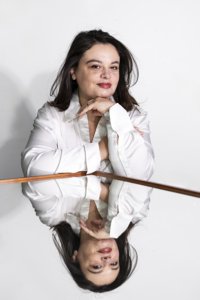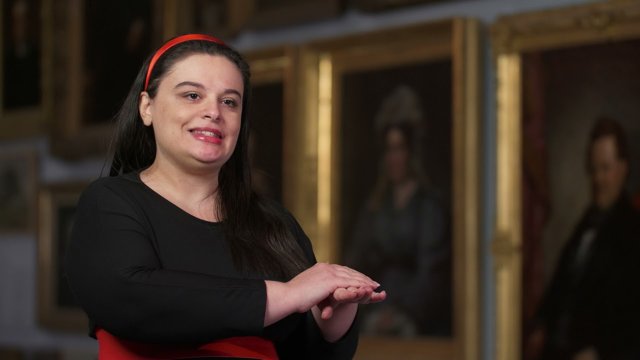In this STAR interview, we speak to Cristina Zaga of the Faculty of Engineering Technology (ET). STAR is an acronym for (S)ituation, (T)asks, (A)ctions, (R)esults. We also have many “star” colleagues at UT with interesting stories to tell. Cristina Zaga works on societal challenges related to (health)care and technology, the future of work in times of automation and digitalisation, health transitions and technology.
Situation
What is/was the situation (S) of your research/initiative?
Our society faces grand societal transformation while suffering from inequality and environmental degradation. Notably, the development of AI technology and automation is creating a divide between citizens, policymakers, knowledge institutions, and industry, as well as between different worldviews, political beliefs, and ways of working and living. My research considers people and planetary needs as interconnected, co-shaping, and acting with/through technology. Through this lens, I develop transdisciplinary ways of working and relational design methods toward futures of justice, care, and solidarity between communities, nature, and artificial agents. I am part of DesignLab's Transdisciplinary Innovation Hub and the Human-Centred Design Group (DPM, ET). I am collaborating with colleagues and human/non-human stakeholders to develop approaches such as Responsible Futuring, my fields of application are the future of care and the future of work with robots and AI.
Tasks
What tasks (T) were or are you currently working on?
I am working on research, education, and valorization. I am designing approaches, methods, and tools to facilitate transdisciplinary collaboration to tackle societal challenges and extend knowledge production to a plural set of non-academic and more-than-human actors, avoiding replicating current societal structures and fostering pluralization and socially just change. Together with inspiring colleagues, we are reshaping education, and nurturing collaborations between students and societal stakeholders to redefine the futures we want to live in. I am writing a book together with leading experts in human-robot interaction, a critical compass beyond current robot’s hype and frenzy, and it positions itself as a hands-on manual for developing technology for a future worth wanting. I am engaging and learning from local, national, and international communities of workers, and healthcare practitioners to avoid replicating current societal structures and fostering pluralization and socially just change.
Actions
What actions (A) are you working on and who are involved?
I am currently working on many research and educational projects. To name a few: 1) a project related to automation in the cleaning industry with the RAS (Raad voor Arbeidsverhoudingen Schoonmaak- en Glazenwassersbranche) focusing on ownership and co-imagination of futures of solidarity between humans and robots, 2) the development of a network focusing on social justice and AI financed by the NWO Science Prize for Diversity Equity and Inclusion I have received together with 4TU colleagues in 2022, 3) building a consortium of partners focusing on matters of justice in health transitions such as dementia care and grief care thanks to a Starting Grant from the BMS Faculty of the UT, 4) working with local health organization (Sensire) and students of the award-winning master insert (we won the Dutch Higher Education Award) on reframing the future of healthcare through critical design and futuring, 5) understanding how to use AI in education beyond hype and nurturing critical thinking in students (see paper with my HCD colleagues), 6) engaging in outreach and valorization like my talks in Nijmegen at Extrapool or TU Delft about Inclusive AI, at the International HRI conference on Worker-Robot Relations or the upcoming conversation on Transdisciplinarity and Design at the Design Research Society conference in Boston, 7) supporting my colleagues at the DesignLab to develop an academy for life-long learning of futures literacy to think long-term and navigate responsible futures.
Results
What results (R) do you hope to achieve, and how will society (or UT organization) perceive them?
My ultimate goal is to create communities of belonging that co-shape technological development, integrating different worldviews, beliefs, and ways of working and living in a spirit of solidarity and learning. My tools, techniques, and approaches will practically help towards this goal. In the short term, I want to engage civil society stakeholders and workers and co-create AI systems that affect them with radical transparency. I want to contribute to e-health technology that does not dehumanize and exclude. I hope to provide engineers and computer scientists with a window to designerly ways of knowing, socio-technical reflections, and methodological eclectism, which contribute to developing reflexivity about developing AI technology, questioning the current status quo, and stimulating a generalized curiosity about other epistemologies and methodologies. I want to inspire my students to be critical of the status quo and resist to current narratives to generate positive societal and environmental impact. I hope to contribute to widespread reflexivity, questioning, and curiosity. Finally, I hope to stimulate a transformative process toward pluriversal futures where diverse actors coexist and thrive.







